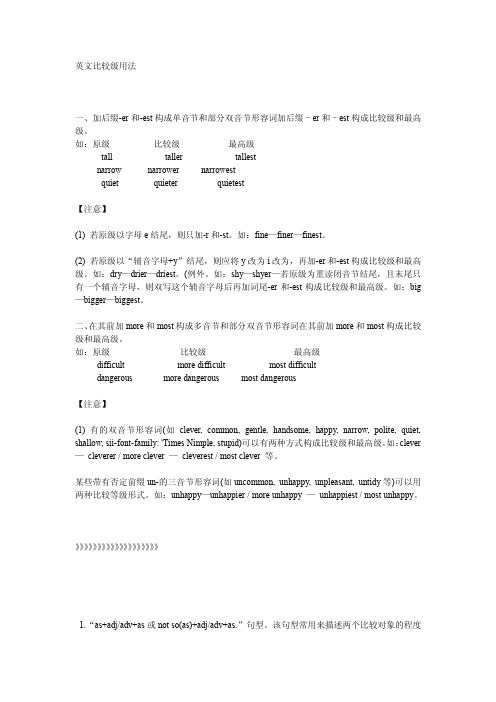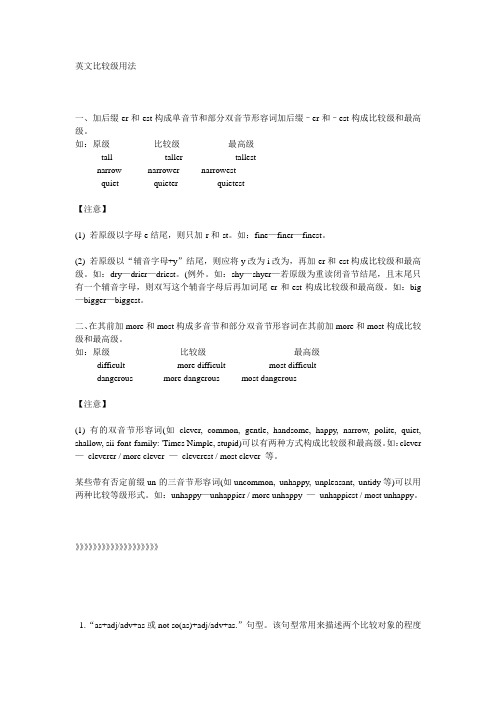最新英语比较级的用法总结
- 格式:doc
- 大小:19.00 KB
- 文档页数:4

形容词的比较级最高级用法小结【摘要】本文旨在总结形容词的比较级和最高级的用法。
在比较级的构成方式中,通常在形容词后面加上"-er"或者在前面加上"more"来表示比较级。
而最高级的构成方式则是在形容词后面加上"-est"或者在前面加上"most"来表示最高级。
比较级和最高级的用法需要根据不同情况来选择合适的形式。
在使用过程中需要注意一些细节,比如单音节形容词和部分双音节形容词的变化规则。
文章还列举了一些常见的错误用法,帮助读者避免在写作中犯错。
总结了本文的要点,帮助读者更好地掌握形容词比较级最高级的用法。
【关键词】形容词的比较级最高级用法小结,比较级的构成方式,最高级的构成方式,比较级和最高级的用法,注意事项,常见错误,总结1. 引言1.1 形容词的比较级最高级用法小结形容词的比较级和最高级是英语中用来表示事物之间的比较的重要语法结构。
比较级用于比较两个事物的性质,而最高级则用于表示在一个群体中某个事物的性质是最高的。
本文将对形容词的比较级和最高级用法进行小结:比较级的构成方式:一般在形容词后面加上“-er”,如“bigger”、“faster”等。
但也有一些形容词需要在前面加上“more”来表示比较级,如“more beautiful”、“more expensive”等。
有些形容词的比较级形式是不规则的,需要进行记忆,如“good”变为“better”、“bad”变为“worse”等。
比较级用于比较两个事物的性质,通常用“than”连接两个比较对象,如“My car is faster than yours”。
最高级用于表示在一个群体中某个事物的性质是最高的,通常用“the”来引导最高级,如“She is the tallest girl in the class”。
常见错误:一些学习者常常混淆不规则形式的比较级和最高级,需多加练习来熟练记忆。

英文比较级用法一、加后缀-er和-est构成单音节和部分双音节形容词加后缀–er和–est构成比较级和最高级。
如:原级比较级最高级tall taller tallestnarrow narrower narrowestquiet quieter quietest【注意】(1) 若原级以字母e结尾,则只加-r和-st。
如:fine—finer—finest。
(2) 若原级以“辅音字母+y”结尾,则应将y改为i改为,再加-er和-est构成比较级和最高级。
如:dry—drier—driest。
(例外。
如:shy—shyer—若原级为重读闭音节结尾,且末尾只有一个辅音字母,则双写这个辅音字母后再加词尾-er和-est构成比较级和最高级。
如:big —bigger—biggest。
二、在其前加more和most构成多音节和部分双音节形容词在其前加more和most构成比较级和最高级。
如:原级比较级最高级difficult more difficult most difficultdangerous more dangerous most dangerous【注意】(1) 有的双音节形容词(如clever, common, gentle, handsome, happy, narrow, polite, quiet, shallow, sii-font-family: 'Times Nimple, stupid)可以有两种方式构成比较级和最高级。
如:clever —cleverer / more clever —cleverest / most clever 等。
某些带有否定前缀un-的三音节形容词(如uncommon, unhappy, unpleasant, untidy等)可以用两种比较等级形式。
如:unhappy—unhappier / more unhappy —unhappiest / most unhappy。

英语比较级的用法总结The Use of Comparative Degree in English。
The comparative degree is used to compare two or more things, people, or actions. It is an important part of English grammar and is used in a variety of situations. In this document, we will summarize the different ways in which the comparative degree is used in English.1. Formation of Comparative Degree。
The comparative degree is formed by adding -er to the end of the adjective for short adjectives, and by using more + adjective for long adjectives. For example:Short adjective: fast → faster。
Long adjective: beautiful → more beautiful。
2. Comparative Degree with "Than"When comparing two things, people, or actions, the word "than" is used to introduce the second element of the comparison. For example:My car is faster than yours.She is more beautiful than her sister.3. Irregular Forms of Comparative Degree。

英文比较级用法一、加后缀-er和-est构成单音节和部分双音节形容词加后缀–er和–est构成比较级和最高级。
如:原级比较级最高级tall taller tallestnarrow narrower narrowestquiet quieter quietest【注意】(1) 若原级以字母e结尾,则只加-r和-st。
如:fine—finer—finest。
(2) 若原级以“辅音字母+y”结尾,则应将y改为i改为,再加-er和-est构成比较级和最高级。
如:dry—drier—driest。
(例外。
如:shy—shyer—若原级为重读闭音节结尾,且末尾只有一个辅音字母,则双写这个辅音字母后再加词尾-er和-est构成比较级和最高级。
如:big —bigger—biggest。
二、在其前加more和most构成多音节和部分双音节形容词在其前加more和most构成比较级和最高级。
如:原级比较级最高级difficult more difficult most difficultdangerous more dangerous most dangerous【注意】(1) 有的双音节形容词(如clever, common, gentle, handsome, happy, narrow, polite, quiet, shallow, sii-font-family: 'Times Nimple, stupid)可以有两种方式构成比较级和最高级。
如:clever —cleverer / more clever —cleverest / most clever 等。
某些带有否定前缀un-的三音节形容词(如uncommon, unhappy, unpleasant, untidy等)可以用两种比较等级形式。
如:unhappy—unhappier / more unhappy —unhappiest / most unhappy。


英语语法——比较级与最高级用法总结1. Adding "-er" to the adjective:Examples:- This book is longer than that book.- John is taller than his brother.2. Adding "more" before the adjective:Examples:- She is more beautiful than her sister.- The film was more interesting than I expected.3. Using "less" before the adjective:Examples:- This car is less expensive than that one.- The weather is less unpredictable during the summer.- Good → better: He is better at math than his classmates. - Bad → worse: This s ituation is worse than I expected.- Far → farther/further: I can't walk any farther/further. - I prefer coffee to tea. (not "than tea")Superlatives:1. Adding "-est" to the adjective:Examples:- She is the tallest girl in the class.- That was the funniest joke I've ever heard.2. Adding "most" before the adjective:Examples:- He is the most intelligent person I know.- The film was the most thrilling I have ever watched.3. Using "least" before the adjective:Examples:- This is the least expensive option available.4. Irregular superlatives:Some adjectives have irregular forms when making superlatives:- Good → the best: She is the best student in the class.- Bad → the worst: It was the worst meal I've ever had.- Far → the farthest/furthest: He l ives thefarthest/furthest from the city.Superlatives are usually preceded by the definite article "the". For example:- He is the tallest person in the room.- This car is faster than that car.- She is smarter than her sister.Superlatives:- He is the best player in the team.- That was the most interesting book I've ever read. - Well → better / best- Badly → worse / worst- Little → less / least- Much → more / most- My car is as fast as yours.- She is as tall as her sister.。
初中英语知识点归纳比较级和最高级形容词的用法初中英语知识点归纳:比较级和最高级形容词的用法形容词是我们日常英语中非常常见的词类之一,它能够描述人、事、物的性质或特征。
在初中英语学习中,学生需要掌握比较级和最高级形容词的用法。
本文将对比较级和最高级形容词的用法进行归纳总结。
一、比较级的用法比较级是用来对两个人或两个事物进行比较的形式。
比较级通常由“more/most + 形容词”构成,也有一些例外。
1. 比较级的基本形式比较级的基本形式是通过在形容词前面加上“more”来构成的。
例如:- Mary is more intelligent than Susan.(玛丽比苏珊更聪明。
)- The city is more beautiful than the countryside.(这座城市比农村更美丽。
)2. 以字母e结尾的形容词对于以字母e结尾的形容词,只需要在形容词后面加上“r”来构成比较级。
例如:- He is braver than his sister.(他比他妹妹更勇敢。
)3. 以辅音字母+y结尾的形容词对于以辅音字母+y结尾的形容词,需要将y替换为i,并在形容词后面加上“er”来构成比较级。
例如:- The story is funnier than the movie.(这个故事比电影更有趣。
)4. 以重读闭音节结尾的形容词对于以重读闭音节结尾的形容词,需要双写最后一个字母,并在形容词后面加上“er”来构成比较级。
例如:- The house is bigger than the apartment.(这座房子比公寓大。
)5. 特殊形式有一些形容词的比较级是不规则的,需要特殊记忆。
例如:- good → better(好→ 更好)- bad → w orse(坏→ 更坏)- little → less(少→ 更少)- much/many → more(多→ 更多)二、最高级的用法最高级是用来对三个或三个以上人或事物进行比较,表示“最……的”。
英语比较级的用法英语比较级的用法英语比较级是用来表达两个事物进行比较的形式,它的常见用法包括:1. 形容词比较级形容词比较级用来比较两个或多个事物在某个方面的程度或质量。
常见形容词比较级的构成方式有以下几种:•一般形容词比较级:在形容词后面加上 -er,如“bigger”(更大的)、“faster”(更快的)。
•双音节及部分形容词比较级:在形容词前面加上“more”(更)或“less”(更少),如“more beautiful”(更美丽的)、“less crowded”(更不拥挤的)。
•部分不规则比较级:如“good”(好)的比较级是“better”(更好的),“bad”(坏)的比较级是“worse”(更差的)。
2. 副词比较级副词比较级用来比较两个或多个动作或状态在某个方面的程度。
构成副词比较级的方式与形容词类似:•一般副词比较级:在副词后面加上 -er,如“faster”(更快地)、“higher”(更高地)。
•双音节及部分副词比较级:在副词前面加上“more”(更)或“less”(更少),如“more easily”(更容易地)、“less often”(更少地)。
•部分不规则副词比较级:如“well”(好地)的比较级是“better”(更好地),“badly”(糟糕地)的比较级是“worse”(更糟糕地)。
3. 名词比较级名词比较级主要用于表达两个或多个事物在数量或程度上的差异。
常见的名词比较级用法有以下几种:•比较数量:使用“more”(更多的)或“fewer”(更少的)来表达两个事物数量上的差异,如“more students”(更多的学生)、“fewer cars”(更少的汽车)。
•比较程度:使用“higher”(更高的)或“lower”(更低的)来表达两个事物在程度上的差异,如“highertemperature”(更高的温度)、“lower price”(更低的价格)。
4. 动词比较级动词比较级主要用于比较两个或多个动作或状态在程度上的差异。
比较等级的常见句型归纳(1)两者相比,甲=乙,用“as +形容词或副词原级+ as‖。
如:He is as tall as I/me.他和我一样高。
He got up as early as I did.他和我起得一样早。
注:当as…as中间有名词时,名词要放在形容词之后。
如:This is as good an example as the other is.这个例子和另外一个一样好。
I can carry as much paper as you can.你能搬多少纸,我也能。
(2)两者相比,甲<乙,用“as/so+形容词或副词原级+as‖。
如:He cannot run so/as fast as you.他没你跑得快。
Corn doesn’t need as/so much water as rice.玉米不需要稻谷那么多水。
(3)两者相比,甲>乙,用―比较级形容词或副词+ than‖。
如:You are taller than I. 你比我高(from www.yygrammar)。
He reads more careful than I.他比我看书更认真。
(4)多者比较,用“the+最高级+比较范围‖。
如:Tom is the tallest in his class.汤姆是他班里个子最高。
Kate wrote (the) most carefully of all.凯特是所有人中写得最认真的。
最高级前不用the的五种情况(1) 形容词最高级前通常用the,副词最高级前的the可以不用。
(2) 形容词最高级作表语时,有时可以省略the。
如:Which of the boys is (the) strongest?这些孩子中哪个最强壮?(3) 最高级形容词作表语,副词用状语时,没和别人比较时不用the。
如:He’s busiest on Monday.他星期一最忙。
He works hardest when doing something for his family.他为自己家做事时最卖力。
中考英语--形容词、副词的原级、比较级用法总结形容词/副词原级、比较级原级(表示人/物自身的情况时,或者同级比较时用原级)例如:The flower is very beautiful.这朵花跟漂亮。
Lily is as old as Cathy.Lily 和Cathy一样大。
原级的句型:主语+系动词(be动词)+as +形容词原级+as ...主语+实义动词+as +副词原级+as...(和...一样...)例如:Tom is as tall as Lily.Tom和Lily一样高。
Tom runs as quickly as Lily.Tom和Lily跑得一样快。
否定句.. not as/so + 形容词/副词原级+as... (前者不如后者... ) =... less + 形容词/副词原级+than ...例如:Tom isn’t as tall as Lily.Tom不如Lily高。
Tom doesn’t run as quickly as Lily.Tom不如Lily跑得快。
常见的修饰形容词/副词原级的程度副词:very, too, so, quite, enough等。
例如:The weather in Chongqing is very hot in summer.夏天,重庆的天气非常热。
比较级(用于两者之间的比较,用来表示“前者比后者更……”)例如:Tom is taller than his brother.Tom比他的弟弟更高。
Tom runs faster than his brother.Tom比他的弟弟跑得更快。
1. 形容词/副词的比较级变化:规则变化:(1)一般在词尾直接加er。
例如:tall-taller,long-longer(2)以不发音的字母e结尾的单词在词尾直接加r。
例如:nice-nicer,cute-cuter(3)以辅音字母+y结尾的词,把y变为i,再加er。
精品文档
精品文档
☆形容词的比较级☆
当我们需要对事物作出比较时,需要用到比较级。
比较级的句子结构通常是:
什么 + 动词be (am , is , are ) + 形容词比较级 + than(比)+ 什么 ,如:
I’m taller and heavier than you.
(我比你更高和更重。)
An elephant is bigger than a tiger.
(一只大象比一只老虎更大。)
形容词的比较级是在形容词的基础上变化而来的,它的变化规则是:
① 一般的直接在词尾加er ,如 tall - taller , strong - stronger ,
② 以e结尾的,直接加r ,如 fine – finer ,
③ 以辅音字母加y结尾的,先改y为i再加er,如funny - funnier
④ 双写最后的字母再加er,如big – bigger, thin – thinner ,
hot – hotter
除此之外,还有几个特殊的单词,它的比较级和最高级都是不规则的,如:
many / much(原形)– more(比较级)– most(最高级)
little / few(原形) – less (比较级)– least(最高级)
good(原形) – better(比较级) – best(最高级)
bad (原形) – worse(比较级) – worst(最高级)
far (原形) – further– furthest
附加:形容词的最高级变化类似于比较级,只是把词尾的er改成est,如:
tall (原形)- taller (比较级)- tallest (最高级)
long(原形)- longer(比较级)- longest(最高级)
big (原形)- bigger(比较级)- biggest(最高级)
☆注意☆ 比较的两者应该是互相对应的可比较的东西。
典型错误:My hair is longer than you.(我的头发比你更长。)
比较的两者是我的头发、你(整个人),那么比较的对象就没有可比性。
精品文档
精品文档
应该改为:My hair is longer than yours. 或My hair is longer than your hair.
附:如果比较的两者是一样的时候,我们会用 as…as…这个词组,它的
用法是:
什么+be+as+形容词原形+as+什么,意思是什么和什么一样……。如:
I’m as tall as you.
(我和你一样高。)
My feet are as big as yours.
(我的脚和你的一样大。)
比较级专项练习
一、从方框中选出合适的单词完成句子
(1) How is the Yellow River?
(2) How is Mr Green? He’s 175cm.
(3) How are your feet? I wear size 18.
(4) How is the white T-shirt? It’s 100 yuan.
(5) How apples are there in the bag? There are 5.
(6) How is the fish? It’s 2kg.
二、根据句意写出所缺的单词
(1) I’m 12 years old. You’re 14. I’m than you.
(2) A rabbit’s tail is than a monkey’s tail.
(3) An elephant is than a pig.
heavy tall long much many big
精品文档
精品文档
(4) A lake is than a sea.
(5) A basketball is than a football.
三、根据中文完成句子.
(1)
(2) 我比我的弟弟大三岁. I’m than my brother.
(3) 这棵树要比那棵树高. This tree than that one.
(4) 你比他矮四厘米. You are than he.
(5)
(6) 谁比你重? than you.
(7)
(8) 他比你更强壮. He is than you.
四、根据答句写出问句
(1) I’m 160 cm.
(2) I’m 12 years old.
(3) My shoes are 80 yuan.
精品文档
精品文档
(4) Amy’s hair is 30 cm long.
(5) I have three English books.